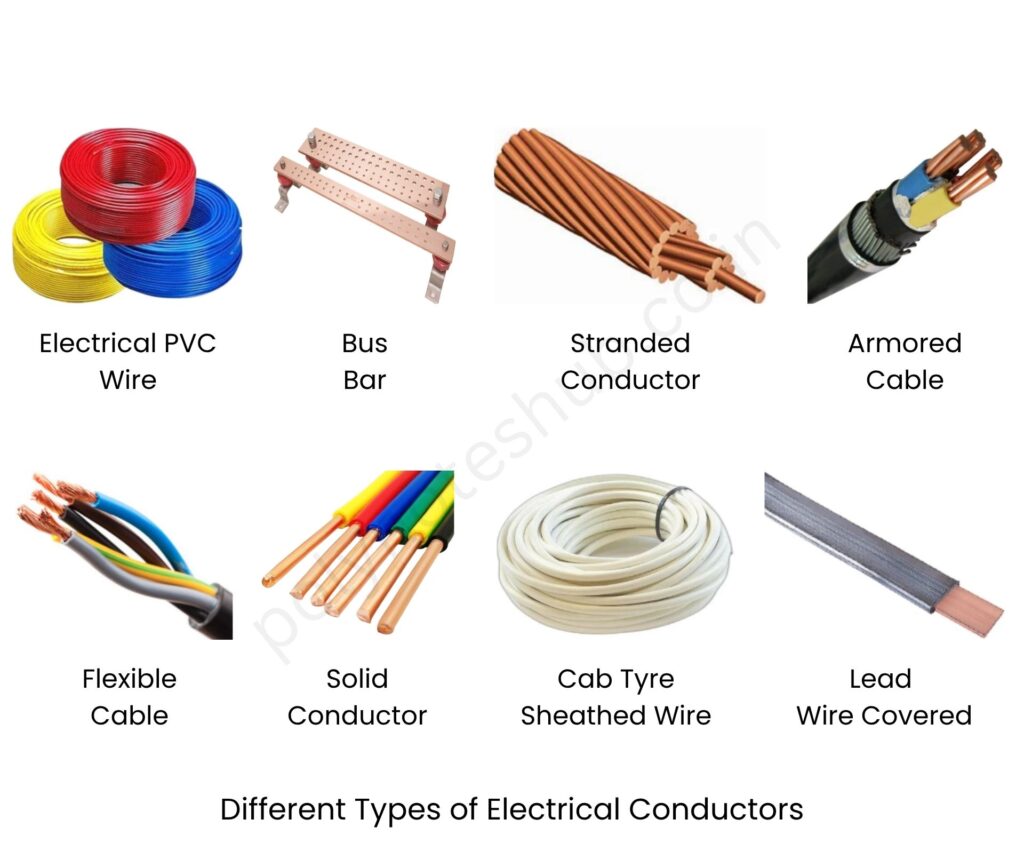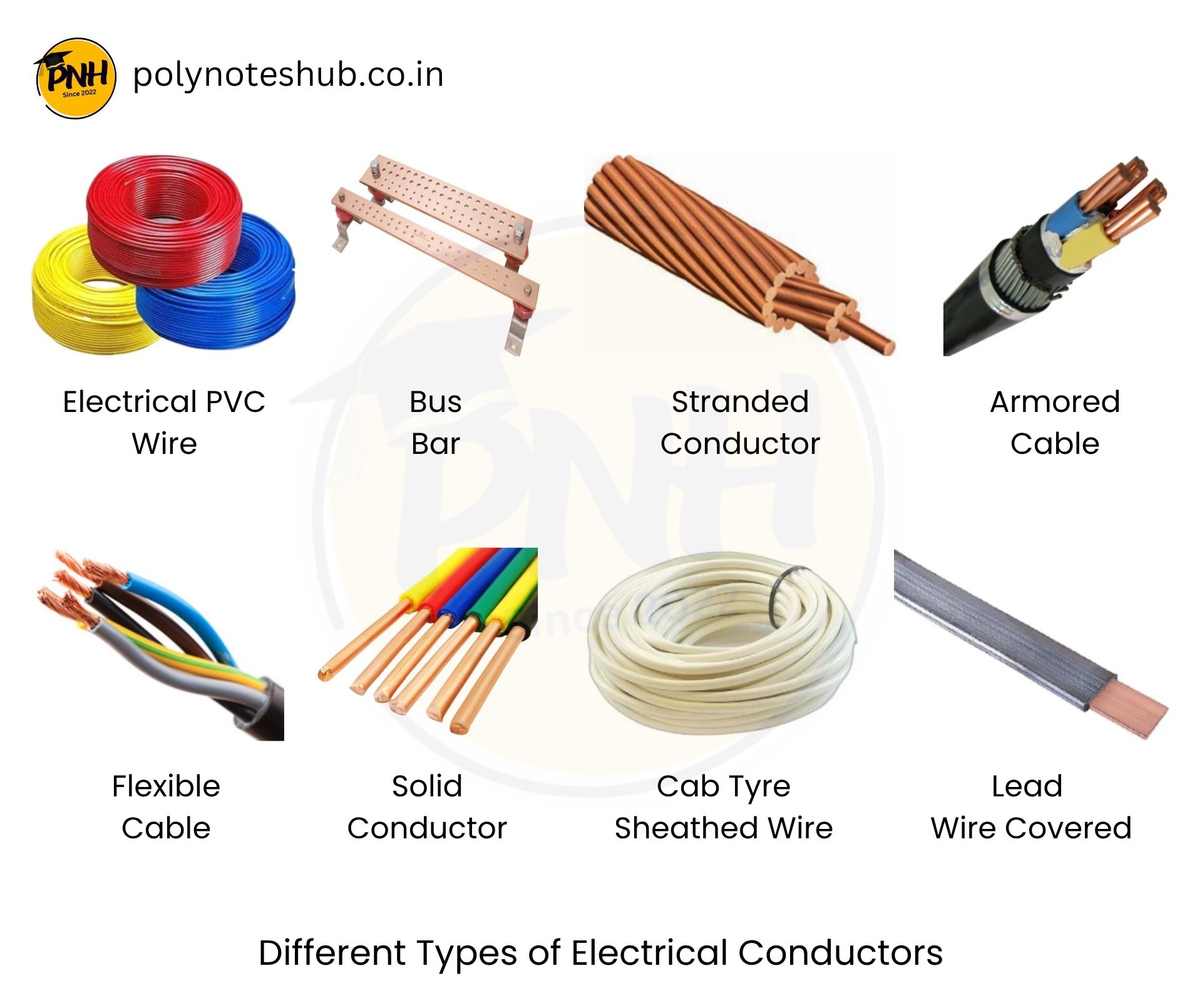In this note, we are going to know about different types of electrical conductors that are used electrical wiring. Welcome to Poly Notes Hub, a leading destination for engineering notes.
Author Name: Arun Paul.
Different Types of Electrical Conductors
Here we have listed different types of conductor and cables that are used in electrical wiring –

1. Electrical Wire
A wire is a single cylindrical conductor, typically made of copper or aluminum, that transports electric current from one place to another. It can be bare or insulated and is widely employed in electrical systems due to its simplicity, conductivity, and cost-effectiveness.
Application: Used in household wiring, small appliances, control panels, and light fixtures.
2. Electrical Cable
A cable is made up of two or more insulated conductors that have been bundled together and protected by an outer sheath. It is used to transfer electrical power or communication information across great distances, and its design varies depending on the application, such as armored, flexible, or coaxial versions.
Application: Used in power transmission, electrical supply systems, communication networks, and industrial installations.
3. Bus Bar
A bus bar is a thick, flat strip of conductive material, usually copper or aluminum, that is used to transport significant amounts of electrical power between switchboards, panel boards, and distribution boards. It enables for efficient current flow with minimal voltage drop and is intended to carry high current loads securely.
Application: Used in power distribution panels, switchgear, substations, and high-current control panels.
4. Stranded Conductor
A stranded conductor is formed by twisting together numerous small-gauge wires to create a single bigger conductor. This increases flexibility, lowers the risk of breakage caused by repeated bending, and improves performance in dynamic electrical situations. Stranded conductors are commonly insulated and utilized in applications that involve frequent movement.
Application: Used in flexible cables, portable equipment, vehicle wiring, and industrial machinery.
5. Armored Cable
An armored cable is a power cable with a metal casing (typically steel) that protects it from mechanical damage, moisture, and chemical exposure. It is suited for outdoor or underground installations where the climate may pose a threat to traditional insulated cables, providing longevity and safety under tough situations.
Application: Used in underground cabling, industrial plants, outdoor wiring, and hazardous locations.
6. Flexible Cable
Flexible cables are made using fine-stranded conductors and soft insulation layers, allowing them to bend and twist repeatedly without breaking. These cables are lightweight and robust, making them perfect for dynamic applications that require frequent motion or vibration. They are available in a variety of sizes and insulation options.
Application: Used in robotics, portable tools, moving equipment, and electronic devices.
7. Solid Conductor
A solid conductor is a single, solid thread of copper or aluminum. It has less resistance and costs less than stranded wire. However, it is robust and less flexible, making it ideal for fixed wiring where little movement is envisaged after installation.
Application: Used in residential wiring, switchboard connections, internal building installations, and circuit boards.
8. PVC Wire
PVC (Polyvinyl Chloride) wires are electrical cables coated with PVC, a thermoplastic material that is resistant to heat, chemicals, and moisture. These wires are inexpensive, lightweight, and long-lasting, making them popular for both residential and industrial wiring applications in safe, dry conditions.
Application: Used in home wiring, commercial buildings, control panels, and internal circuits.
9. CTS Wire (Cab Tyre Sheathed)
CTS wire is a rubber-insulated conductor with a thick protective sheath made of vulcanized rubber or PVC. It is mostly utilized in low-voltage and indoor electrical systems that require long-lasting insulation due to its strength and resistance to moisture.
Application: Used in residential and commercial lighting circuits and switchboard connections.
10. LC Wire (Lead Covered)
Lead Covered (LC) wire is a type of insulated electrical wire that is wrapped in a lead sheath. This lead coating protects the conductor against corrosion, moisture, and chemicals, making it ideal for use in hazardous or damp locations. Though less prevalent nowadays, it was widely employed in older underground systems.
Application: Used in underground installations, chemical industries, and areas with high moisture or chemical exposure.
11. FR Wire (Fire Retardant)
Fire retardant (FR) wire is designed with a specific insulation that resists ignition and prevents fires from spreading. These wires can endure high temperatures while emitting little smoke, making them perfect for areas where fire safety is paramount. They adhere to fire safety regulations and construction codes.
Application: Used in schools, hospitals, theaters, offices, and residential buildings for fire-safe wiring.

